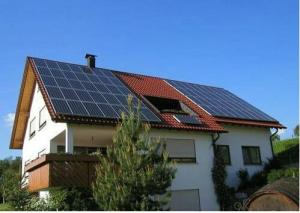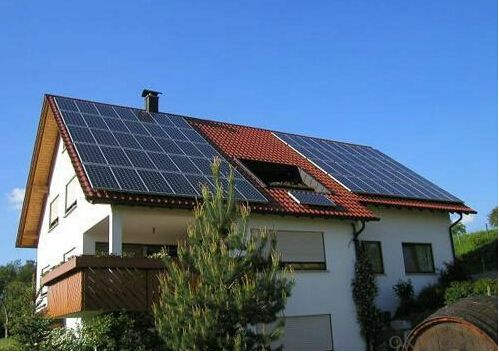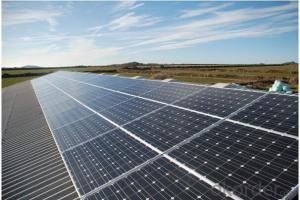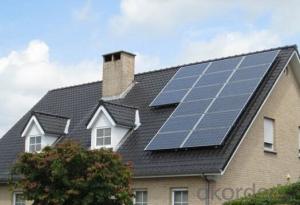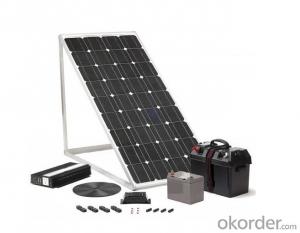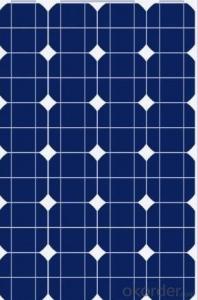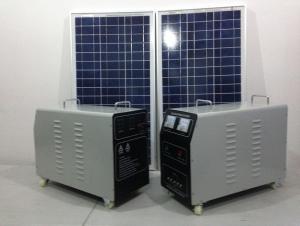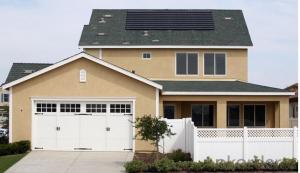Solar Energy Systems Companies' 500W Solar System Made in China
- Loading Port:
- China Main Port
- Payment Terms:
- TT OR LC
- Min Order Qty:
- -
- Supply Capability:
- -
OKorder Service Pledge
Quality Product, Order Online Tracking, Timely Delivery
OKorder Financial Service
Credit Rating, Credit Services, Credit Purchasing
You Might Also Like
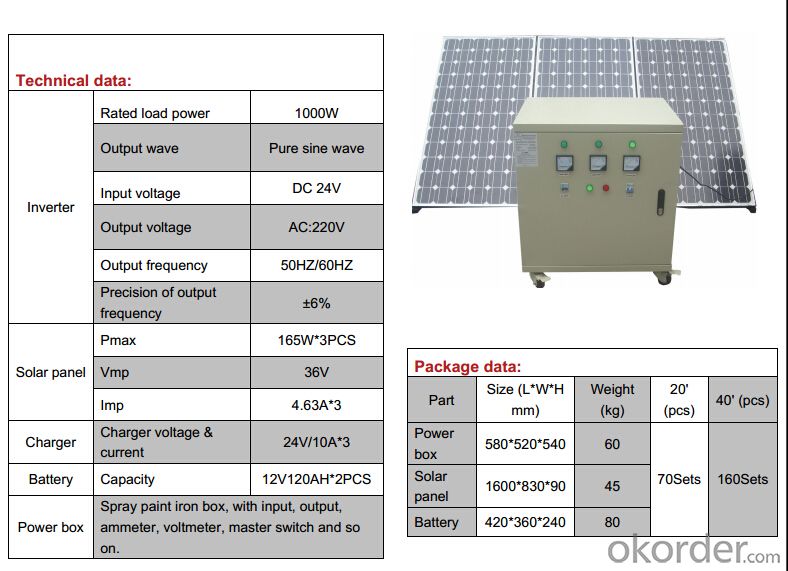
- Q: How do solar energy systems contribute to reducing noise pollution compared to traditional power generation methods?
- Solar energy systems contribute to reducing noise pollution compared to traditional power generation methods because they do not rely on mechanical components like turbines or generators that produce loud noises. Instead, solar panels convert sunlight directly into electricity, resulting in a silent operation. This absence of noise helps in creating a more peaceful and less disruptive environment for both humans and wildlife.
- Q: Can solar energy systems be used for powering off-grid wildlife monitoring stations?
- Yes, solar energy systems can be used for powering off-grid wildlife monitoring stations. Solar panels can capture sunlight and convert it into electricity, which can then be stored in batteries for use during the night or cloudy days. This makes it a reliable and sustainable source of power for remote wildlife monitoring stations that are located far away from the grid. Additionally, solar energy systems are cost-effective and environmentally friendly, making them an ideal choice for powering off-grid wildlife monitoring stations.
- Q: Are there any safety concerns associated with solar energy systems?
- Yes, there are some safety concerns associated with solar energy systems. The main concerns include the risk of electric shock during installation or maintenance, fire hazards due to faulty wiring or equipment, and potential exposure to hazardous materials during manufacturing or disposal. However, with proper installation, maintenance, and adherence to safety standards, these risks can be effectively mitigated, making solar energy systems a safe and reliable source of renewable energy.
- Q: Can solar energy systems be used for powering electric vehicle car-sharing programs?
- Solar energy systems have the potential to power electric vehicle car-sharing programs effectively. The utilization of solar panels installed on car-sharing stations or nearby buildings can generate renewable and clean energy. This energy can then be used to charge the electric vehicles in the program. By incorporating solar energy, car-sharing programs can greatly diminish their carbon footprint and reduce their dependence on fossil fuels. Moreover, solar-powered car-sharing initiatives can benefit from reduced operating costs by eliminating the need for costly grid electricity, which is susceptible to price fluctuations. In summary, the integration of solar energy systems into electric vehicle car-sharing programs offers an environmentally friendly and sustainable solution.
- Q: How does temperature affect the efficiency of solar panels?
- Temperature affects the efficiency of solar panels by reducing their overall performance. As the temperature increases, the efficiency of solar panels decreases because the heat can cause the semiconductor material within the panel to have higher resistance, resulting in a reduced electrical output. This phenomenon, known as the temperature coefficient, varies depending on the type of solar panel technology being used.
- Q: What is the difference between a solar lease and a solar purchase?
- A solar lease involves renting the solar panels from a third-party provider, typically with no upfront costs but with monthly lease payments. On the other hand, a solar purchase involves buying the solar panels outright, either through a loan or with cash, and owning the system. With a purchase, there may be upfront costs, but the homeowner receives financial benefits such as tax credits and energy savings.
- Q: Can solar energy systems be used for powering electric vehicles charging stations?
- Yes, solar energy systems can be used to power electric vehicle charging stations. Solar panels can generate electricity from sunlight, which can then be stored in batteries or directly used to charge electric vehicles. This renewable energy source is environmentally friendly and can help reduce the carbon footprint associated with transportation.
- Q: Can solar energy systems be used in areas with limited sunlight hours?
- Solar energy systems can indeed be utilized in regions with minimal sunlight hours. Although solar panels generate the highest amount of energy when directly exposed to sunlight, advancements in technology have made it feasible for solar systems to still produce electricity even in areas with limited sunlight. One method to tackle the issue of limited sunlight hours is by installing solar panels that are more efficient at capturing and converting sunlight into electricity. These high-efficiency solar panels can optimize energy production even in areas with reduced sunlight. Additionally, the utilization of tracking systems that tilt and follow the sun's path throughout the day can also aid in increasing energy output. Another approach involves storing excess energy generated during peak sunlight hours in batteries. This stored energy can then be utilized during periods of low sunlight, enabling the solar system to continue powering homes or businesses even in the absence of sunlight. Furthermore, integrating solar power with other renewable energy sources, such as wind or hydroelectric power, can help compensate for limited sunlight hours. By combining different sources, a more reliable and consistent energy supply can be achieved. In conclusion, although limited sunlight may impact the energy production of solar systems, there are numerous technological solutions and strategies that can be employed to make solar energy feasible even in areas with fewer sunlight hours.
- Q: How do solar energy systems impact the reduction of greenhouse gas emissions?
- The reduction of greenhouse gas emissions is significantly impacted by solar energy systems. Unlike fossil fuels, solar energy systems generate electricity without emitting any greenhouse gases like carbon dioxide (CO2) or methane (CH4) during operation. This is because solar panels capture the sun's energy to produce electricity, which is a clean and renewable power source. By replacing traditional energy sources such as coal or natural gas, solar energy systems alleviate the need for burning fossil fuels, which are the main contributors to greenhouse gas emissions. When burned for electricity generation, fossil fuels release large amounts of CO2 and other pollutants into the atmosphere. In contrast, solar energy is generated through photovoltaic (PV) panels or solar thermal collectors, which do not have any emissions. Additionally, solar energy systems indirectly help in reducing greenhouse gas emissions. When solar power is integrated into the electricity grid, it displaces electricity produced from fossil fuel power plants. This displacement reduces the overall demand for fossil fuels and consequently decreases greenhouse gas emissions from the power sector. Moreover, solar energy systems can be implemented on various scales, ranging from small residential installations to large utility-scale solar farms. This versatility allows solar power to be used in both urban and rural areas, offering clean energy solutions to different communities. By promoting the adoption of solar energy systems, governments and organizations can expedite the shift towards a low-carbon economy and mitigate the adverse effects of climate change. In conclusion, solar energy systems play a crucial role in reducing greenhouse gas emissions by generating clean electricity without emitting any greenhouse gases during operation. By displacing fossil fuel-based electricity generation and encouraging the use of renewable energy, solar power significantly contributes to the mitigation of climate change and the creation of a sustainable future.
- Q: How do solar energy systems affect electricity bills?
- Solar energy systems can significantly reduce electricity bills by generating clean and renewable energy from the sun. By producing electricity onsite, homeowners and businesses can offset their reliance on the grid and decrease their overall energy consumption. This can result in lower electricity bills as less power needs to be purchased from utility providers. Additionally, surplus energy produced by solar panels can be fed back into the grid through net metering programs, allowing users to earn credits or receive compensation for the excess electricity they generate.
Send your message to us
Solar Energy Systems Companies' 500W Solar System Made in China
- Loading Port:
- China Main Port
- Payment Terms:
- TT OR LC
- Min Order Qty:
- -
- Supply Capability:
- -
OKorder Service Pledge
Quality Product, Order Online Tracking, Timely Delivery
OKorder Financial Service
Credit Rating, Credit Services, Credit Purchasing
Similar products
Hot products
Hot Searches
Related keywords
